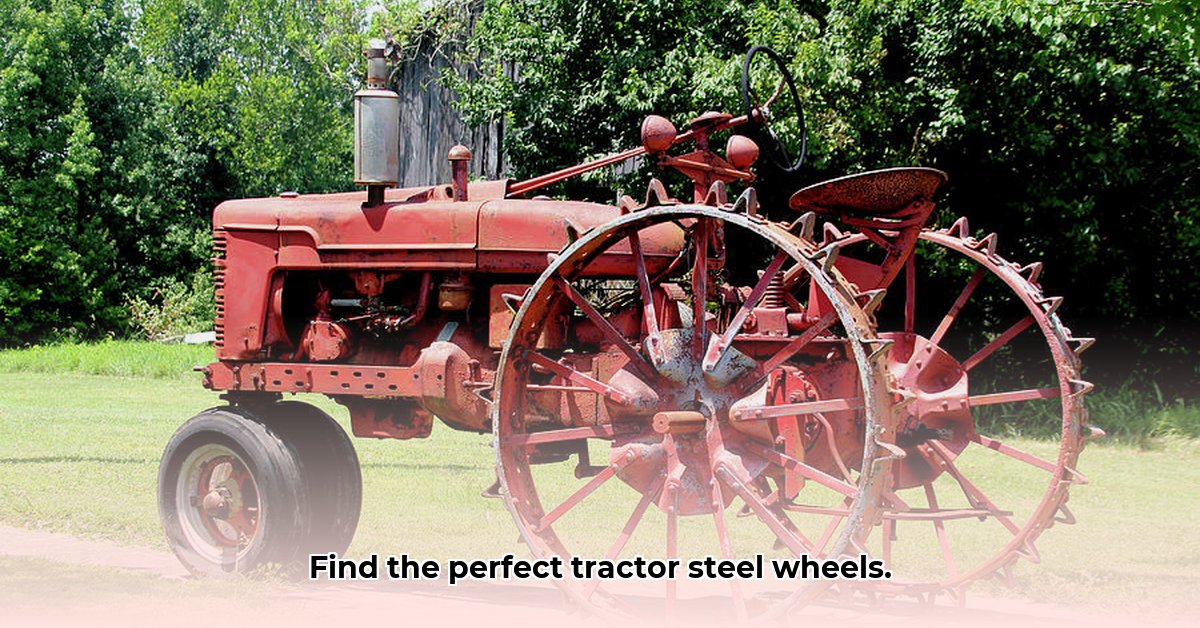
Choosing the right tractor steel wheels is crucial for optimal performance, efficiency, and longevity. This comprehensive guide simplifies the process, equipping you with the knowledge to make informed decisions, regardless of your experience level. For even more in-depth information, check out this helpful resource on tractor tires: tractor tire guide.
Understanding Tractor Steel Wheels: Types and Specifications
Tractor steel wheels are not one-size-fits-all. Key specifications determine their suitability for specific applications. Understanding these factors is the first step to making the right choice.
- Diameter: The overall size of the wheel (height). Larger diameters generally allow for taller tires, improving ground clearance.
- Width: Affects traction. Wider wheels provide better grip, particularly in soft or muddy conditions.
- Thickness: Impacts strength and durability. Thicker wheels are better suited for heavy loads and rough terrain.
- "Push Out" vs. "Cut Out": Refers to the wheel's design and mounting method. A quick online image search will clarify the visual differences and ensure proper fit.
Navigating the Market: New vs. Used Wheels & Price Factors
The market offers a range of new and used tractor steel wheels, each with its own price point and considerations.
- New Wheels: Higher upfront cost but offer peace of mind, typically including a warranty against defects. They guarantee consistent quality and meet specified standards.
- Used/Reconditoned Wheels: More affordable, but require careful inspection for damage (cracks, bends, excessive wear). Thorough examination is crucial before purchase. Scratches are less significant than structural issues.
- Price Variability: Several factors influence pricing: wheel size (larger wheels cost more), thickness (thicker wheels are more expensive), and condition (new wheels command higher prices than used ones).
Finding a reputable supplier is essential. Check online reviews and seek recommendations from fellow farmers. Compare prices and specifications from multiple sources before making your decision. A warranty can offer significant protection against unexpected problems.
Making the Right Choice: A Step-by-Step Guide
Selecting the optimal wheels involves a structured decision-making process. Follow these steps:
- Assess Your Tractor: Identify your tractor's make, model, and typical workload to determine appropriate wheel sizes and specifications.
- Define Your Budget: Determine your spending limit. Weigh the higher upfront cost of new wheels against the potential long-term savings and reliability.
- Consider Terrain and Workload: Heavy loads and challenging terrain necessitate robust, durable wheels.
- Check Availability: Lead times vary depending on size and demand. Plan ahead to avoid delays.
- Compare Suppliers: Obtain at least three quotes, comparing prices, specifications, and warranty terms. Don't solely focus on the lowest price; consider overall value.
- Inspect Before Purchase (Crucial for Used Wheels): Meticulously examine used wheels for cracks, bends, excessive wear, and damage.
Maintenance and Care: Extending Wheel Lifespan
Proper maintenance significantly extends the life of your tractor steel wheels.
- Regular Inspections: Check for wear and tear, loose bolts, and damage. Address minor issues promptly to prevent escalation.
- Cleaning: Keep wheels clean to prevent rust and corrosion.
- Storage: Store wheels properly, ideally covered to protect against the elements. Lubricate moving parts as needed.
Resources and Further Reading
For additional information and resources, consult reputable agricultural publications and websites specializing in agricultural equipment. Sites specializing in tractor parts and accessories are also valuable sources of information.
How to Choose the Right Agricultural Wheel Rims Based on Material and Warranty (Important Considerations):
- Rim Material: Steel rims are stronger but heavier, potentially affecting fuel efficiency. Aluminum rims are lighter but may be less durable.
- Warranty: A comprehensive warranty protects your investment. Research suppliers and compare offered warranties.
- Rim Type (W, DW, TW): Understanding these designations is vital, but additional research is needed to fully understand their performance differences.
This guide provides a solid foundation for selecting the right tractor steel wheels. Remember that careful planning, thorough research, and informed decision-making are crucial for long-term success and efficiency.